LINKS PRESS SERVICES DISCOVER VIDEO GENETICS' schema |
a little genetics of colours...
As our horses have all a solid body colour, I will only explain theese (no paint horses)
The color is due to an interaction between many genes, we think of 16 different genes, but we don't know all of them, and there are some hypothesis. All horses pictured are our Rockies (or KMH)... A horse always carries 2 forms of a gene, one coming from his dam, the second from his sire. If the 2 forms are the same, the horse is homozygotic. When we use a capital letter, the color due to this gene will be seen. If the letter is a small letter, this gene will not be expressed. Horse has a basic color. It is cause by the extende gene, wich is symbolised by the letter E or e. E is the black form of extende, and when it is present, the horse is black. e is "no black". When a horse carries ee, it is red color (sorrel or chesnut). 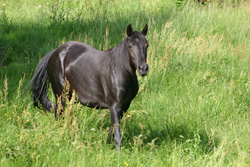 black: Ee (heterozygotic) black: Ee (heterozygotic)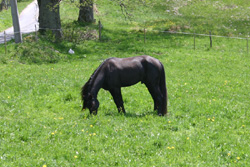 black: EE (homozygotic) black: EE (homozygotic)We can not distinguish EE from Ee just seeing the horse 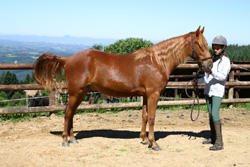 sorrel: ee sorrel: eeThis basic color will be dilued by many genes. The first one is the agouti gene (A or a). a does nothing. A will limited the black color to the "black points": legs, mane and tail. A black horse becomes bay with one A gene, and we can not see it on a red horse. 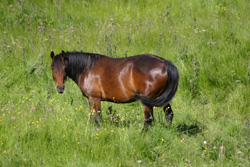 bay tested Ee Aa bay tested Ee AaA bay horse can be EE A...no red gene but still have the redich body colour. An other wellknown gene is cream (Cr or cr). cr does nothing. If the horse carries one cream gene (Crcr), it will dilue the red in yellow: sorrel becomes palomino 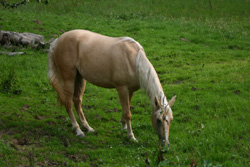 palomino: ee Crcr (this mare can be Aa) palomino: ee Crcr (this mare can be Aa)bay becomes buckskin 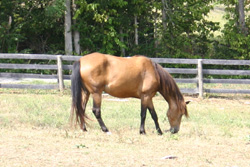 buckskin: E A Crcr buckskin: E A Crcrchocolate become silver buckskin 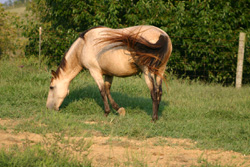 silver buckskin: Ee Aa Crcr Zz silver buckskin: Ee Aa Crcr Zzwe usually can't see it on a black horse, but some have a strange play of color. We call that smokey. 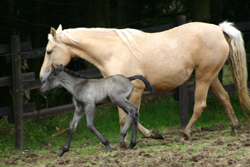 smokey (the foal): Ee aa Crcr smokey (the foal): Ee aa CrcrIf the horse carries 2 cream genes (CrCr), red and black are dilued in cream, and the horse has blue eyes. We use different names depending on the body color: black becomes smokey cream bay becomes perlino sorrel becomes cremello. Most of time, we can not distinguish them, but the parents or lineage could tell you. We don't have cream horses yet. The champagne gene (Ch or ch) is often confused with the cream gene, but the skin is pink. ch do nothing. Ch dilues the red and the black colors, and the eyes color is amber or green, but rarely blue. sorrel becomes gold champagne, confused with palomino, but more shiny. bay becomes amber champagne, confused with buckskin, but more shiny, and legs are not so black but something like chocolate. black becomes classic champagne, the horse is quite pink. 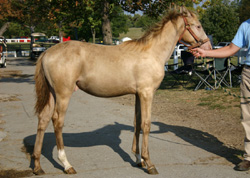 chocolate champagne: Ee aa Zz crcr (tested), Chch chocolate champagne: Ee aa Zz crcr (tested), ChchA horse carrying 2 champagne forms, or champagne + cream is called ivory and blue eyed. The silver dapple gene (Z or z) dilues the black color. black becomes chocolate, with golden mane and tail (very variable), and a dapple body in summer. 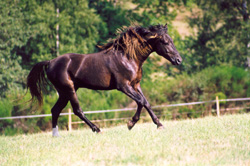 dark chocolate, tested Ee dark chocolate, tested Ee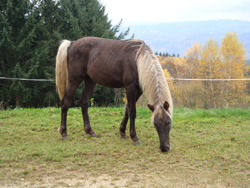 chocolate EE Zz chocolate EE Zzbay becomes red chocolate, sometimes near the chocolate, but the body could never be dappled. 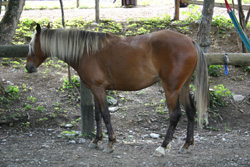 red chocolate E A Z red chocolate E A Zwe can not really see it on sorrel horse, but some are blond mane (and not the tail). 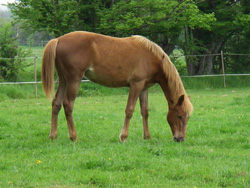 sorrel: ee Zz (tested): mane is lighter, sorrel: ee Zz (tested): mane is lighter,but tail is darker sorrel looks like dark palomino 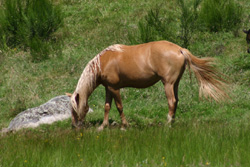 tested: ee crcr ZZ tested: ee crcr ZZThe roan gene (Rn or rn) dilues the body color with white hairs. rn does nothing. We can't have a homozygotic horse, this gene is lethal: the embryo will not live. A true black horse becomes blue in summer. 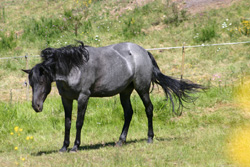 EE Rnrn EE Rnrna chocolate roan 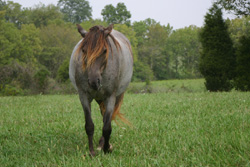 E Z Rnrn E Z RnrnRoan horses become darker in winter. We can not confuse it with grey. The grey horse becomes whiter and whiter with age, born very dark and greys slowly. gr does nothing Gr expesses on any body colour, and the horse becomes whiter years after years on black: (all are heterozygot) 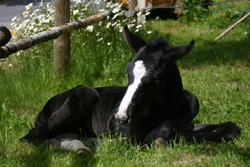 at birth, the horse is dark at birth, the horse is dark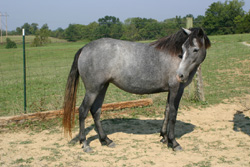 this one is 2 years old this one is 2 years old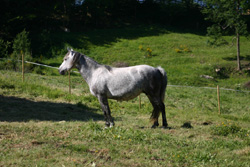 this one is 5 years old this one is 5 years oldon red (?) 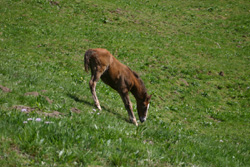 young young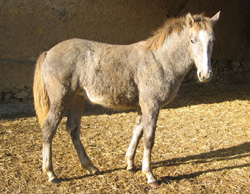 older... older...the dun gene dilues the body color, and gives a lineback and stripes. black becomes donkey grey 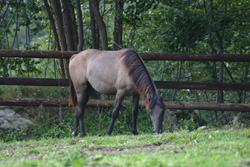 tested: Ee Crcr zz tested: Ee Crcr zzsorrel becomes apricot 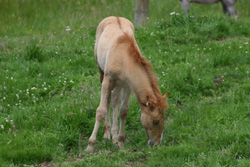 chocolate becomes gruello... 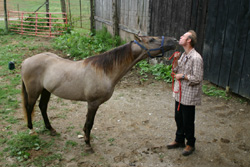 gruello: Ee aa Crcr Zz gruello: Ee aa Crcr Zz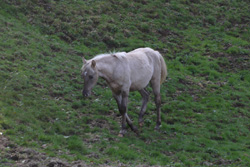 light gruello: EE aa Crcr ZZ light gruello: EE aa Crcr ZZthere is a schema to symbolise all this "blabla"... the arrows indicate what the gene representing on the line (in green) could do. In blue, this is the color name (mostly in english). In grey, this is a part of the genotype (very complicated...) The color point in the spot are the uncommun color eyes. The line in the spot are the mane and tail or the linbake line color. We can test most of theese genes (exept Roan yet) |
|